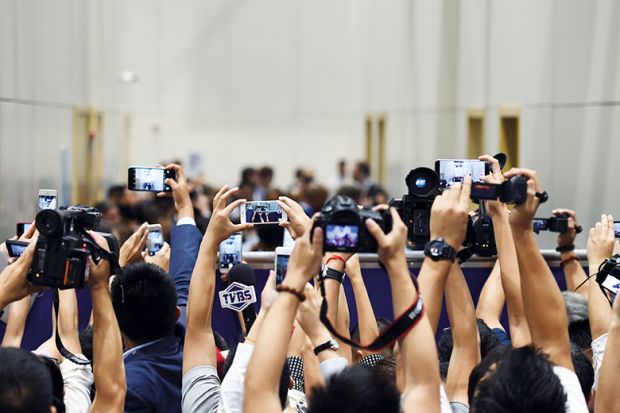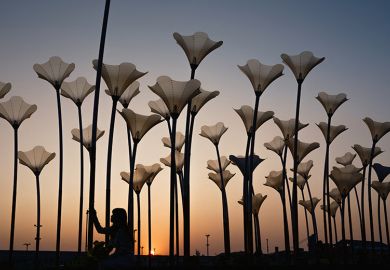Browse the THE Asia University Rankings 2019 results
Something extraordinary happened at City University of Hong Kong (CityU) after a lecture a few years ago. Usually there is a round of applause and the audience files out after a speaker has finished.
But that was not the case at a talk on 3 December 2015.
After the speaker had thanked students and academics for coming and listening to his ideas, members of the audience rushed to the podium to take photos and ask questions. They acted as if the speaker were a movie star.
The speaker that day was no screen idol, but he is considered a superstar among young Chinese. Lee Kai-Fu, a Taiwanese pioneer in the Chinese internet sector and an entrepreneur dedicated to education, quit a well-paid position in information technology in 2009 to found Innovation Works, later renamed Sinovation Ventures – an organisation that helps Chinese youths innovate and start their own businesses.
Seeing the audience mob Lee made me realise just how seriously talented and highly motivated young people are. Given the right opportunities, they have the drive to innovate and create the new knowledge that can contribute significantly to the development of societies in the region. For such young minds, being in the presence of someone such as Lee, who possesses great insight and understanding about the future of IT, the global economy and the need for innovation, was a tremendously rewarding experience.
The reception given to Lee strengthened my firm belief that we need to have experts teaching young people. The hunger for knowledge and the latest research is so great that students want to attend lectures by world-class experts.
This is why it is essential that teaching and research not be cordoned off from each other. The idea that teachers should teach and researchers should research is outdated. Researchers need to bring the fruit of their projects into the classroom so that students may know the latest developments. Technology, for example, is changing rapidly. We don’t have time to wait for research results to trickle down to students in the classroom. Students want to hear directly from people such as Lee. Likewise, teachers need to keep up to date with the latest developments in their field to avoid becoming obsolete.
Seeing the highly appreciative audience at the talk also compelled me to set out a clear vision for collaboration with people across China. Although only a finite number of students from mainland China can attend our programmes at CityU, an infinite number of opportunities exist for collaboration in research, especially in science and technology. That’s why establishing connections is essential if we are to create the kinds of hubs needed for consolidating research and exploring future possibilities.
For example, City University of Hong Kong Chengdu Research Institute (CityUCRI), which was founded in 2017 and is our first research institute in western China, is using CityU’s technology and human resources to boost applied research and outreach to industry. One of the developments so far at CityUCRI has been the establishment of ARTS + iNNOVATION, a hub for creative media and digital technology that will promote exchanges in technology, education and professional training.
On a broader level, collaboration should bring together the best scholars from mainland China and overseas so that they can pursue curiosity-driven research and present their studies to a diverse audience of students, postdocs and researchers from CityU and other universities in Hong Kong and from across the breadth of China. This is indeed the mission of the Hong Kong Institute for Advanced Study, which was established at CityU just over three years ago. This institute is a great example of how some of the world’s foremost scholars in science and engineering from around the world can collaborate with their peers in mainland China.
I am also acutely aware that we must look to the future and that my university has an opportunity to contribute to major initiatives central to China’s development. The Belt and Road strategy, for example, has prompted a great deal of interest in plans to promote economic prosperity among countries along the route and to boost regional economic cooperation, strengthen exchanges and mutual learning, and promote world peace and development.
But perhaps the strongest impression that Lee’s lecture left me was the strength of the “soulware” among the students in the audience that day. We can have all the hardware and software in the world as university educators, but without “soulware” we cannot create or innovate. By “soulware”, I mean a state of mind that brings together a sense of dedication, commitment, application and drive. It’s a sense of spirit that brings to life ideas and lights a spark for ingenuity and innovation.
It would be too idealistic to expect every public speaker to enjoy a similar reception to Lee’s talk at CityU, but that doesn’t stop us aiming high. Our challenge at CityU is to find ways to make connections with students and researchers in mainland China and develop linkages that will place “soulware” at the heart of our collaborations and lead to greater discoveries and innovations.
Way Kuo is president of City University of Hong Kong.
Register to continue
Why register?
- Registration is free and only takes a moment
- Once registered, you can read 3 articles a month
- Sign up for our newsletter
Subscribe
Or subscribe for unlimited access to:
- Unlimited access to news, views, insights & reviews
- Digital editions
- Digital access to THE’s university and college rankings analysis
Already registered or a current subscriber?







